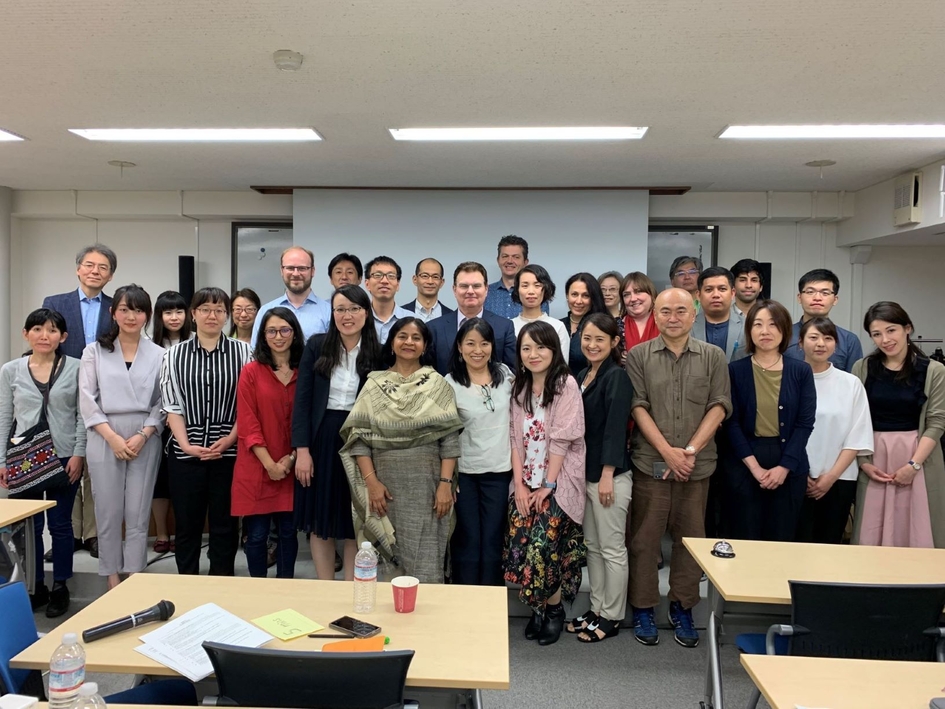Report
Ito International Research Center Symposium “Crossing Boundaries: Migration, Mediation, Morality” was held from 8th to 10th of June, 2019.
Pictures of the Symposium
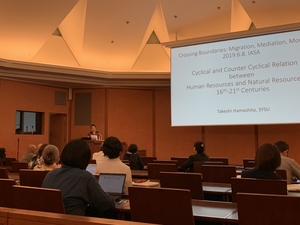 |
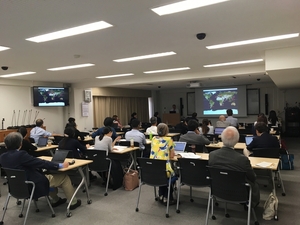 |
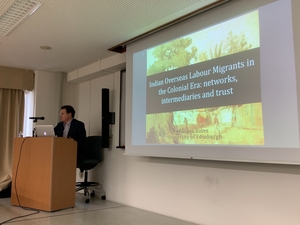 |
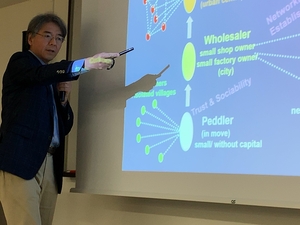 |
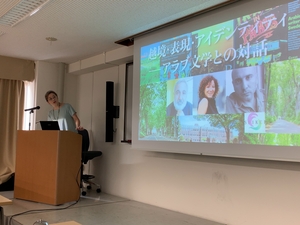 |
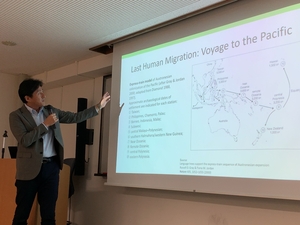 |
The symposium was attended by over 100 researchers, students, and interested citizens. Below are the reports of the symposium written by the participants.
【Report 1】
This symposium provided a truly interdisciplinary perspective on the now highly pertinent topic of international migration. By bringing together leading scholars from fields of anthropology, sociology and the physical sciences, the three-day event allowed participants to cross not only the boundaries of nations and ethnicities, but also disciplines and different angles of looking at the same phenomenon.
Despite the disparate disciplines of its presenters, the symposium accentuated the thematic keyword of “identity” of various peoples, both at the group and individual levels, and asked the audience to question existing identities that are currently taken as granted and matter-of-fact. In one way, the questioning is done by zooming in on little-known minorities (such as Prof. Mirzai’s African-Iranians, Prof. Kuroki’s Lebanese-Brazilians and Prof. Fletcher’s Englishmen in colonial Shanghai). In another way, it occurs when the definitions of commonly accepted terms are problematized (such as Prof. Bates’s “slaves,” Prof. Goto’s “heretic” and Prof. Oka’s “homeland”). By providing nuanced and complex answers to the question of “who are we,” the presenters put forth brand new notions of social belonging that is worthy of continued developments in future studies.
This symposium was particularly innovative in bringing together a group of presenters from the physical sciences, who provided a much longer view of human migration, beyond the confines of race, nation and social groups so central to social scientific research. Prof. Maat, Nakayama and Ota all managed to detect genetic changes in biological organisms (including humans themselves) that suggest how cultural changes, compounded by different environmental conditions in different geographies, concretely shaped how humans live and die. The impact of human migration, as studies of genetics and the environment tells us, changed much more than just the identity of the humans themselves but also many other living creatures. Migration, thus, allows boundaries to be crossed between social and physical sciences in ways that few other topics could so clearly.
The resulting discussions from the presentations are undoubtedly a source of great inspirations for younger scholars and the general audience. At a personal level, my own research, already interdisciplinary in nature, benefits from further extending into many other disciplines via the frameworks proposed by the symposium’s many presenters. The ability to think flexibly across theories, concepts and indeed, a limited part of the world, is a key takeaway that I would like to implement in my own conceptualization of what is a good piece of research in the field of migration studies.
(Written by Mr. Xiaochen Su, Ph.D. Student, Graduate School of Interdisciplinary Information Studies, The University of Tokyo)
【Report 2】
The symposium “Crossing Boundaries: Migration, Mediation, Morality” was an enlightening and precious occasion for me. I was not one of the speakers but was able to participate as an assistant of the symposium organizers. During the symposium, speakers shared research results on human migration of various fields.
To me, the documentary film “Playing with Nan” (2012) directed by Dr. Dipesh Kharel was the most impressive part of this symposium program. The director did not use excessively dramatic images and music, but instead let the cast talk about their abundant emotion and showed the changes threatening a family caused by one of its member’s “Crossing Boundaries” as a migrant worker. Dr. Kharel captured the deep grief of the parents who had to send their son abroad because of their economic situation and the suffering of the son’s wife who came to feel the spatial distance between her and her husband made it more difficult to understand each other. The documentary showed only a family’s personal affairs, but the scenes also seemed universal, as though they could happen to any audience. On the other hand, the film presented the problem on a grander scale, as it indicated in a detached tone that cruel labour environments for foreign workers were tolerated in present Japan, although it was his countryman who overworked the film’s main figure, a Nepalese man, with huge debts and low wages. Japanese people, who probably made up the majority of the symposium’s audience, and Western people whose countries also accepted “cheap labourers” from overseas (labourers who resign themselves to harsh working conditions as long as they are better than those in their own countries) may have faced the international structure in which people of impoverished countries are forced to “cross boundaries”, just like in the family’s case depicted in the film.
When a symposium sets a highly relevant theme like “Crossing Boundaries”, many of audience members might expect to listen to an interpretation of the history that has formed the circumstances of the present world and of problems developing in our current society. Content that can strongly move an audience is not always advisable; however, it is still important to broaden the view of the majority who, consciously or unconsciously, exploit or marginalize immigrants and refugees and to raise their awareness of the issues presented in the film. In this light, I reaffirmed the power of film through “Playing with Nan”.
Research presentations are also powerful, as they have their own roles, like providing objective numeric data and analyses of the subjective views of concerned parties. It is also important that results of the studies are shared widely in an open place like this symposium. Then, how much further can research organizations and academic societies go to turn the spotlight on and to remedy real-world problems while maintaining objectivity and academic quality? ―― The symposium “Crossing Boundaries” left behind this question to me.
(Written by Akiko Itahashi, Assistant Professor, Institute for Advanced Studies on Asia and ASNET, The University of Tokyo)
Information
Day: 8th ~ 10th June, 2019
Venue: Ito Hall, Ito International Research Centre (Morning session on June 8th)
Main Conference Room, Institute for Advance Studies on Asia (Afternoon session of June 8th , all day 9th and 10th)
Aim of the Symposium: :
The International symposium 'Crossing Boundaries' will bring together scholars from many disciplines (history, literature, social and natural anthropology, sociology, political sciences, religious studies, geography, environmental studies, and engineering) to discuss multifaceted aspects of migration.
Contemporary world is faced with an acute crisis of migration. The fact that millions of people are forced to leave their homes in the Middle East and Africa illustrate the failures of the nation state system that characterized the universal mode of human political organization since WWI. With the dissolution of colonial empires, both political leaders and intellectuals hoped sovereign nation states will give rights to every individual and protect their dignity and equality. Yet, international community’s inability to confront and solve ethical, political, and material consequences of the migrants’ movement reveals the deeper political and intellectual defects of the global order of the post-WWII period. Migration as a political, cultural and social phenomenon challenges common ideas of citizenship and morality as many of the nation states fail to give migrants rights, while those societies trying to accommodate waves of migration are witnessing high levels of popular racist backlash among their citizens.
Although scholars, journalist and general public recognize the insufficiency of the nation state system’s ideal response to the migration crisis, we have yet to understand all aspects of this crisis, and imagine a solution or an alternative political culture that can overcome these defects. More importantly, communities of social scientists and humanities scholars must cooperate to reflect on the historical roots and multifaceted aspects of this contemporary crisis to guide political leaders towards a more idealistic solution.
The symposium will re-examine the movement of people in the context of history, environment, culture and evolution, and critically engage with the current discourse on immigration. We will also connect on-going research projects with regional focus and beyond to encourage dialogue beyond disciplinary and regional boundaries.
Program
| DAY 1 | 8th June, 2019 |
| Venue | Morning: Ito Hall, Ito International Research Center Session 1: Main Conference Room, Institute for Advance Studies on Asia |
| 9:30-10:00 Welcome Drink | |
| 10:00-10:10 Opening Remarks Prof Tomoko Masuya (Institute for Advanced Studies on Asia [IASA], Director) |
|
| 10:10-10:20 Rationale of the Symposium Dr Aya Ikegame (Interfaculty Initiative in Information Studies & IASA, UTokyo) |
|
| 10:20-12:00 Keynote Speech Prof Takeshi Hamashita (Sun Yat-sen University, China / The University of Tokyo) “Cyclic and Counter-Cyclic Relations between Human Resources and Natural Resources: 16th-21st Centuries” |
|
| 12:00-13:30 Lunch Break | |
| 13:30-16:00 Session 1: Questioning ‘Unfree’ Labour In this session, historical developments of many forms of ‘slavery’ across the regions will be examined. We commonly consider ‘slavery’ as unfree, exploitative and immoral. The session presents complex and nuanced image of slaves across cultures and regions, and questions the genealogy of anti-slavery discourse. |
|
| Dr Lucio de Souza (Tokyo University for Foreign Studies) “Japanese Slavery and Japanese Diaspora in the Early Modern Period” |
|
| Prof Behnaz Mirzai (Brock University) “Iranian People of African Descent: Local Boundary and National Unity” |
|
| (Coffee Break) | |
| Prof Andrea Major (the University of Leeds, UK) “After Slavery: Debating Global Labour Migration, 1838-42” |
|
| Dr Aya Ikegame (The University of Tokyo) “Devotion and Slavery: Submissive Agency and Development in Modern India” |
|
| 16:15-18:15 Screening of a Documentary Film 'Playing with Nan' (2012) Conversation with the Director Dr Dipesh Kharel | |
| 18:30-20:30 Reception | |
| DAY 2 | 9th June 2019 |
| Venue | Main Conference Room, Institute for Advance Studies on Asia |
| 9:30-10:00 Welcome Drink | |
| 10:00-12:30 Session 2: Imagining of Home and Beyond In our increasingly ‘multicultural’ world, people are imagining and reconstituting what they think is the culture of the ‘home’. For migrants, this social construction of ‘culture’ engages both positively and negatively with the host culture. Their imagination of ‘home’ can also indicate a possible future of home that is otherwise unimaginable in their places of origin. |
|
| Prof Seema Alavi (University of Delhi) “Indian Muslims in the Age of Empire” |
|
| Dr Robert Fletcher (The University of Warwick) “Remittance, Remorse and Filial Duty: Home in the Correspondence of Charles Lenox Richardson (1833-62), Shanghai Merchant” |
|
| (Coffee Break) | |
| Dr Emi Goto (ASNET/ IASA, the University of Tokyo) “Fighting Over Homes: A Story of ‘Heretic’ in the 20th Century Egypt” |
|
| Prof Mari Oka (Kyoto University) “Deterritorializing the “Watan”:Variety of Homeland Image and Lived Experiences of Exiles” |
|
| 12:30-13:30 Lunch Break | |
| 13:30-16:15 Session 3: Connected and Affected Migration has often been understood as combination of the movements of individuals ‘pulled’ by wages offered and ‘pushed’ by social and economic conditions in the place of origin. In this movement, the individual choses ‘rationally’ where she/he would go. In this session, we take collectivity more seriously by arguing that people move because of networks, affective relations and hopes for change that were not necessarily ‘rational’. |
|
| Prof Kazuo Morimoto (IASA, UTokyo) “Why Are the Descendants of the Prophet Muhammad So Widely Distributed?” |
|
| Prof Crispin Bates (the University of Edinburgh) “North Indian Overseas Labour Migrants in the Colonial Era: Networks, Intermediaries and Trust” |
|
| (Coffee Break) | |
| Prof Hidemitsu Kuroki (Tokyo University of Foreign Studies) “Unwittingly globalized: Connectivity of Lebanese and Syrian Migrants During the Late 19th and Early 20th Centuries” |
|
| Prof Shigeto Sonoda (IASA, UTokyo) “Sandwiched by China and Japan: Analyzing Perception toward the ‘Rise of China’ by Second Generation of Chinese Migrants in Japan ” |
|
| Dr Tina Shrestha (Waseda University) "Aspirational Infrastructure: Everyday brokerage and the Foreign-Employment Recruitment Agencies in Nepal" |
|
| 16:15-18:30 Student Workshop: We invite students to present short speeches (10-15 min) on the theme. |
|
| Miki Kinoshita (Ph.D. Student, Osaka University) “Literary Translation in the Qajar Dynasty” Kaori Mizukami (Ph.D. Student, the University of Tokyo) “Indian Immigrants to North America and Their Ports of Call in the Early Twentieth Century” Jiwon Kim (Ph.D. Student, The University of Tokyo) “Repatriation of Keijo Imperial University Alumni and Reintegration into Elite Japanese Society: With a Focus on Bureaucrats and Academics” Xiaochen Su (Ph.D. Student, The University of Tokyo) “A Battle of Resources: Social Integration of and the Perception of Control over Chinese Residents in the Russian Far East” Yuki Nagae (Ph.D. Student,The University of Tokyo) “Parental Beliefs on Preschool-aged Children among Immigrant Families in Japan” |
|
| DAY 3 | 10th June 2019 |
| Venue | Main Conference Room, Institute for Advance Studies on Asia |
| 10:30-11:00 Welcome Drink | |
| 11:00-13:30 Session 4: Environmental Adaptation: The movement of people has brought about dramatic environmental change through the introduction of commercial and food crops. These have turned many tropical regions of the world into plantation colonies. Changes in the natural environment have also encouraged and forced people to move out of their homes. The session brings together historians, social and natural anthropologists, and geographers to engage critically with the relationship between migrant humans and the environment. |
|
| Prof Harro Maat (Wageningen University, the Netherland) “Migrant Foodscapes in the Anglo-Dutch Caribbean: Slavery, Migrant Labour and Peasant Farming 1800-1950” |
|
| Prof Takuro Furusawa (Kyoto University) “History of Human Evolution and Adaptation from Africa to Asia” |
|
| (Coffee Break) | |
| Prof Kazuhiro Nakayama (School of Frontier Sciences, UTokyo) “Local Adaptation and Susceptibility to Lifestyle-related Diseases in East Asia” |
|
| Prof Hiroki Ota (School of Science, UTokyo) “Adaptation to Cultural Environments Found in Human Genome Diversity” |
|
| 13:30-14:30 Lunch Break | |
| 14:30-15:30 Session 5: Relational Approaches to Migration | |
| Prof. Eiji Nagasawa (Tokyo University of Foreign Studies & Islam-Gender Studies, Project Leader) “Beyond the Boundaries: Our Challenge with Islam-Gender Studies” |
|
| Prof. Shigeto Sonoda (IASA, UTokyo) “Survey on Second Generation Chinese Migrants in Australia and Japan” |
|
| Prof Crispin Bates (the University of Edinburgh) “Becoming ‘Coolies’: Re-thinking the origin of Indian Ocean Labour Migration in the Colonial Era” |
|
| 15:30-16:00 Coffee Break | |
| 16:00-17:00 Round Table: Searching for a New Ethics Chairs and/or some of the presenters of the previous sessions will join. |
|
| 17:00-17:15 General Comments & Closing Remarks Prof Takafumi Ishida (School of Science & ASNET, UTokyo) |
The latest information https://asnet-utokyo.jp/studies/event/5373
Organizers:
The University of Tokyo (Institute for Advanced Studies on Asia (IASA) , Network for Education and Study on Asia (ASNET))
Co-organizers:
The Center for South Asian Studies at the University of Tokyo (TINDAS) Integrated Area Studies on South Asia
Grant-in-Aid for Scientific Research on Innovative Areas: Relational Studies on Global Crises, Establishing a New Paradigm of Social/ Human Sciences based on Relational Studies (Project Leader, Keiko Sakai, Chiba University)
Grants-in-aid for Research/Basic Research A: Towards the construction of ‘Islam & Gender Studies’: Building foundations for comprehensive discussion on gender justice and Islam (Project Leader, Eiji Nagasawa, the Tokyo University of Foreign Studies)
Contact: crossingboundaries2019[at]gmail.com

